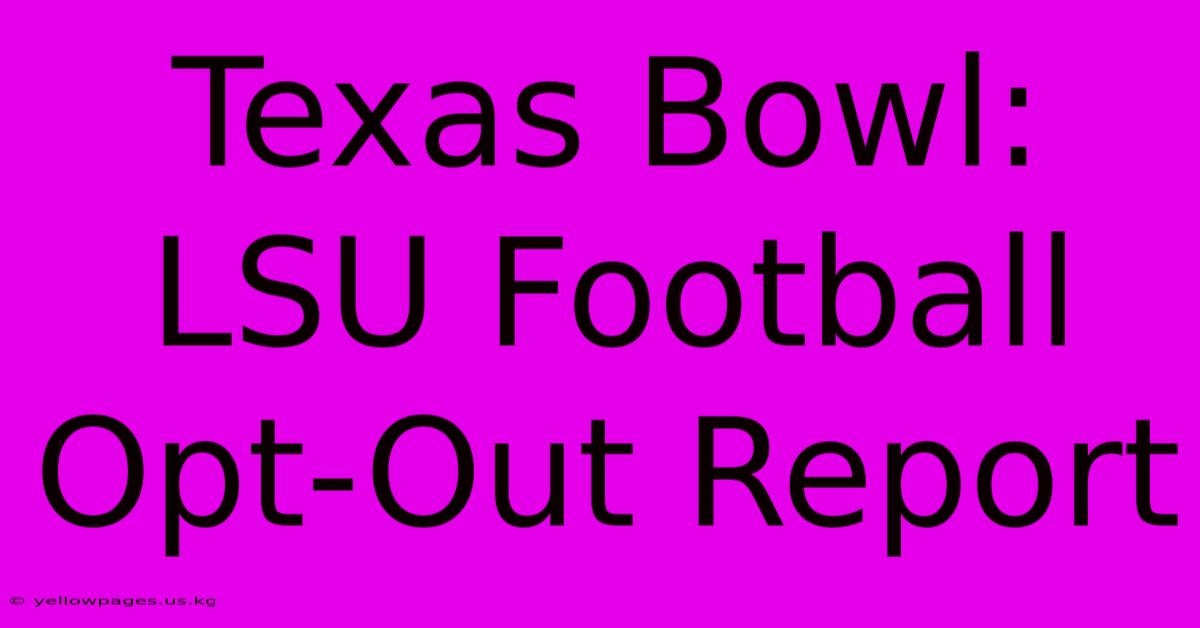Texas Bowl: LSU Football Opt-Out Report

Discover more detailed and exciting information on our website. Click the link below to start your adventure: Visit Best Website trendingnews.us.kg. Don't miss out!
Table of Contents
Texas Bowl: LSU Football Opt-Out Report
The Texas Bowl, typically a festive conclusion to the college football season, took on a different complexion for LSU in 2023. While the Tigers secured a bowl bid, the game was overshadowed by a significant number of player opt-outs. This article delves into the details surrounding these opt-outs, examining the reasons behind the decisions and their impact on the team's performance and future prospects.
Understanding the Opt-Out Phenomenon
Opt-outs in college football have become increasingly common, particularly in bowl games. Players choose to skip these games for a variety of reasons, primarily focusing on injury prevention, preparation for the NFL Draft, and personal reasons. The decision is a deeply personal one, weighing the risks and rewards of participating in a non-championship game against long-term career aspirations.
The LSU Opt-Out Situation: A Closer Look
LSU's opt-out situation for the Texas Bowl was noteworthy due to the number of players involved and their positions on the team. Key players, including several starters and significant contributors, chose to forego the game. This depleted the roster and impacted the team's overall depth and competitive edge. While the specific reasons behind each individual decision haven't always been publicly disclosed, the prevailing factors generally align with the broader trend across college football.
Injury Prevention: A Primary Concern
Many players opt out to avoid the risk of injury in a game that doesn't hold championship implications. A serious injury sustained in a bowl game could have significant ramifications for NFL Draft prospects or even future playing careers. The decision to prioritize long-term health over a single bowl game is a rational choice for players aiming for professional football.
NFL Draft Preparation: Focusing on the Future
For players projected to be high NFL Draft picks, the bowl game might not offer the same value as dedicated training and preparation for the scouting combine and individual team workouts. This period of concentrated effort could prove far more beneficial in enhancing their draft stock and securing a lucrative professional contract.
Personal Reasons: Beyond the Field
Beyond the professional implications, personal reasons such as family matters or academic commitments also factor into a player's decision to opt out. These are often highly individual and private circumstances, and it is important to respect player’s choices without undue speculation.
Impact on the Texas Bowl and Beyond
The high number of LSU opt-outs undoubtedly affected the team's performance in the Texas Bowl. The absence of key starters created significant gaps in the lineup, making it harder for the team to compete at its full potential. This situation highlights the complexities faced by college football teams balancing bowl game participation with player development and individual aspirations.
Long-Term Implications for LSU Football
While the Texas Bowl result might have been impacted by the opt-outs, it's important to consider the long-term implications. By allowing players to prioritize their future careers, LSU is implicitly acknowledging the evolving landscape of college football and the importance of player well-being.
Conclusion: Navigating the Changing Landscape
The LSU opt-out situation in the Texas Bowl underscores the changing dynamics in college football. While bowl games remain important events, the increasing frequency of player opt-outs reflects a shift in priorities, placing a greater emphasis on individual player development and long-term career prospects. The balance between team success and individual aspirations continues to be a defining challenge for college football programs. The LSU experience, while potentially disappointing in the short term, offers a valuable case study in navigating these evolving circumstances. It highlights the need for greater transparency and understanding regarding player opt-out decisions, fostering a more supportive and sustainable environment for student-athletes.

Thank you for visiting our website wich cover about Texas Bowl: LSU Football Opt-Out Report. We hope the information provided has been useful to you. Feel free to contact us if you have any questions or need further assistance. See you next time and dont miss to bookmark.
Featured Posts
-
2025 Winter Classic Drone Cam One Take
Jan 01, 2025
-
3 Key Takeaways Alabamas Bowl Defeat
Jan 01, 2025
-
Relia Quest Bowl Live Game Blog Alabama Vs Michigan
Jan 01, 2025
-
Total Power Outage Affects Puerto Rico
Jan 01, 2025
-
Understanding The Brangelina Divorce Timeline
Jan 01, 2025
